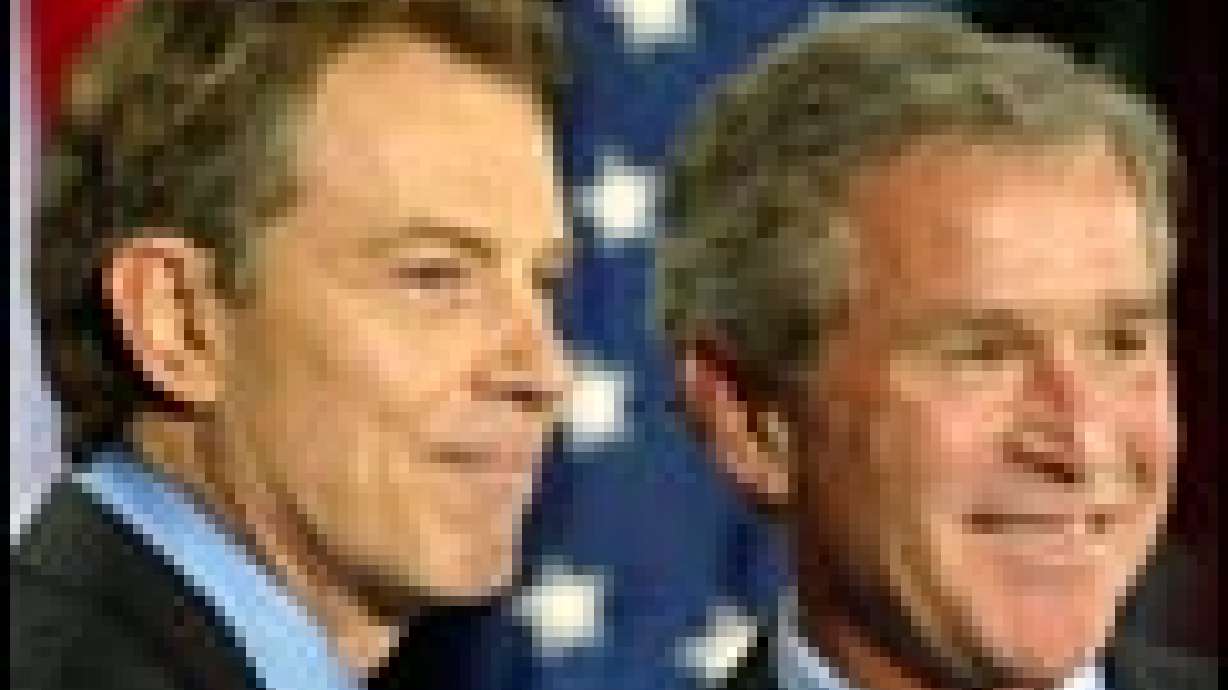Estimated read time: 5-6 minutes
This archived news story is available only for your personal, non-commercial use. Information in the story may be outdated or superseded by additional information. Reading or replaying the story in its archived form does not constitute a republication of the story.
LONDON (AP) -- Prime Minister Tony Blair told an inquiry Thursday that his office did not exaggerate estimates of Saddam Hussein's weapons of mass destruction and said that he would have had to resign if it had.
Facing the worst crisis of his six years in office, Blair questioned the credibility of a British Broadcasting Corp. report that his government distorted the threat presented by Saddam to bolster the case for an Iraq war.
"It was an extraordinary allegation to make and an extremely serious one," he told an inquiry into the death of a government weapons expert who was caught up in a political storm over the government's Iraq policy.
"This was an absolutely fundamental charge ... this was an allegation that we had behaved in a way that, were it true ... would have warranted my resignation," he added.
Blair, who spoke for about two hours, is only the second British prime minister to appear in public before a judicial inquiry. The first was his immediate predecessor, Conservative Prime Minister John Major, who appeared before an inquiry into the supplying of arms to Iraq in the 1990s.
Blair said a contentious government dossier on Iraq's arsenal, released in September, was based on intelligence sources and was not manipulated for political reasons.
"At that stage, the strategy was not to use the dossier as the immediate reason for going to conflict, but as the reason why we had to return to the issue of Saddam's weapons of mass destruction," he said.
The failure of the coalition to find stockpiles of chemical and biological weapons in Iraq since the war ended has seemed more damaging to Blair than to President Bush, who relied heavily on Blair as his top coalition partner.
Looking calm, Blair said a claim in the dossier that Iraq could deploy weapons of mass destruction within 45 minutes came from British intelligence and was not inserted at the insistence of his office.
"I also knew it had to be a document that was owned by the Joint Intelligence Committee and its chairman, John Scarlett. ... We could not produce this as evidence that came from anything other than an objective source," he said.
Blair was giving testimony before an inquiry on why arms expert David Kelly, 59, apparently committed suicide after being identified as the likely source of the BBC report.
Blair has vigorously denied misleading lawmakers or the public in the run-up to war. The BBC report sparked a bitter dispute between the public broadcaster and the government, with the credibility of both at stake.
Dozens of anti-war protesters jeered Blair as he arrived Thursday at the Royal Courts of Justice in central London. Scores of people had lined up outside the building for a chance to hear Blair give evidence before the inquiry, headed by senior appeals judge Lord Hutton.
The Hutton inquiry is trying to determine how the government came to expose Kelly -- a move that placed him under intense media pressure and led him to give testimony before two parliamentary committees. On July 18, three days after he testified, police found Kelly's body with his left wrist slashed.
Blair said at that time that he did not authorize the scientist's identification by government officials.
But he told the inquiry Thursday that he took responsibility for the decisions by officials that led to Kelly being identified publicly after the scientist told superiors at the Ministry of Defense he might be the source for the BBC story. Blair said the action was necessary to ensure all the facts were known.
"I take full responsibility for the decisions. I stand by them. I believe they were the right decisions," Blair said. "It was better just to be open."
Blair was asked if Kelly was under too much pressure. He said nothing he had heard indicated that Kelly was "anything other than someone of, you know, a certain robustness who was used to dealing with the media."
In Wednesday's hearing, Defense Secretary Geoff Hoon said Blair's office authorized a news release saying an unidentified official at the Defense Ministry -- where Kelly worked -- had acknowledged speaking to a BBC journalist. That created a rush by British reporters to identify the source, with some guessing names until they came up with Kelly's and it was confirmed by the Defense Ministry.
Hoon also told the inquiry that Kelly had been treated well and protected by his bosses.
The BBC report, broadcast May 29, said an official dossier in September about Iraqi weapons had been "sexed up" by including a claim that Iraq's biological and chemical weapons could be deployed in 45 minutes.
The story cited a then-unidentified source as having said Blair's office overruled intelligence advice when it included the claim in the dossier. Kelly said he didn't believe he was the report's source for that information; after he died, the BBC said he was.
Also scheduled to appear before Lord Hutton on Thursday are Gavyn Davies, chairman of the BBC, and Tom Mangold, a journalist and close friend of Kelly.
Blair's predecessor, Major, appeared at a 1994 inquiry that he had ordered to unravel the controversy over whether the government violated its own policy on weapons sales to Iraq under his predecessor, Margaret Thatcher.
Major, a minister in Thatcher's government, testified that he knew nothing of a decision to relax guidelines on sales of arms and defense-related equipment to Iraq in the late 1980s. British companies sold parts for a giant gun and machine tools capable of making ballistic missiles and artillery shells to Iraq right up until Saddam invaded Kuwait in August 1990.
(Copyright 2003 by The Associated Press. All Rights Reserved.)








